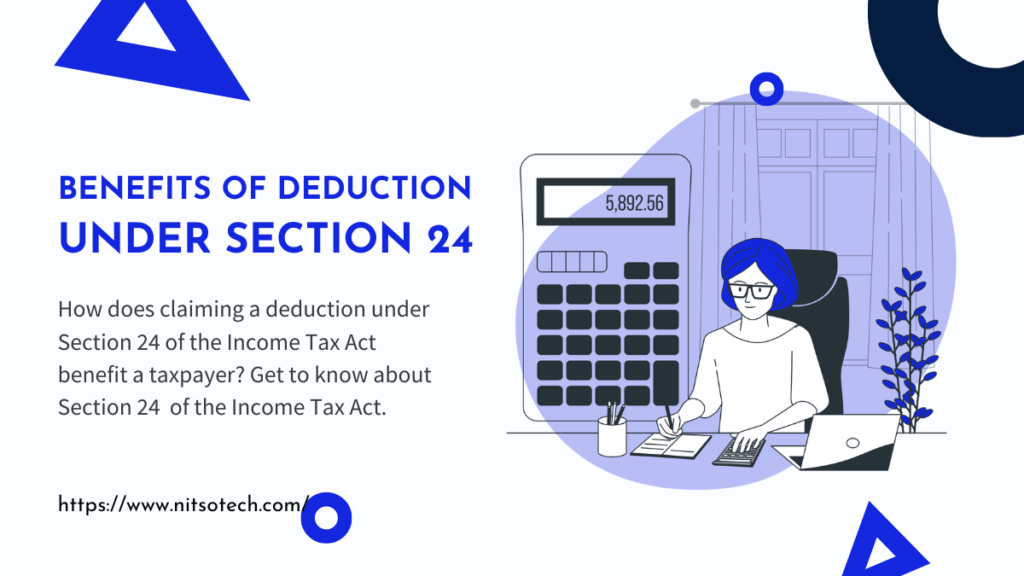Introduction
The Income Tax Act is a complex set of laws and regulations that can be difficult for the average taxpayer to navigate. However, understanding the various provisions of the Income Tax Act is crucial for anyone looking to save money on their taxes. One such provision is Section 24 of Income Tax Act.
Section 24 of the Income Tax Act allows individuals to claim a deduction on the interest paid on a housing loan. The deduction can be claimed for a self-occupied property, a let-out property, or a property deemed to be let out. This deduction is available for both individuals and Hindu Undivided Families (HUFs).
Understanding Section 24 is important for taxpayers who have taken a housing loan as it can help them reduce their taxable income and save on taxes. Moreover, with the rising cost of real estate, many people rely on housing loans to purchase a home, making it crucial to understand how to claim deductions under Section 24 of Income Tax Act.
Table of Contents
Deduction under Section 24 of Income Tax Act
Eligibility criteria for claiming the deduction
To claim a deduction under Section 24 of Income Tax Act, the following eligibility criteria must be met:
- A loan must be taken to purchase or construct a residential property.
- The loan must be taken from a bank, financial institution, or approved charitable institution.
- The property should be owned and used by the taxpayer for residential purposes, either by the taxpayer or their family.
- The construction of the property must be completed within five years from the end of the financial year in which the loan was taken.
Calculation of deduction under Section 24
The amount of deduction that can be claimed under Section 24 of Income Tax Act depends on the type of property and its usage. For self-occupied properties, the maximum deduction that can be claimed is up to ₹2 lahks per annum. For let-out properties, there is no maximum limit on the deduction that can be claimed on the interest paid on loan.
Maximum limit of deduction
There is a maximum limit on the deduction that can be claimed under Section 24 of the Income Tax Act. The maximum limit for deduction is ₹2 lakh per annum for self-occupied properties. For let-out properties, there is no maximum limit on the deduction that can be claimed on the interest paid on loan. It is important to note that this deduction is only available for the interest paid on the loan and not on the principal amount.
Exceptions under Section 24 of the Income Tax Act
Conditions under which deduction is not allowed
While Section 24 of Income Tax Act allows for deductions on housing loans, there are certain conditions under which the deduction is not allowed. The following are some of the conditions under which the deduction is not allowed:
- If the loan is taken for the purpose of renovating, repairing, or renewing an existing property.
- If the loan is taken for a property that is not used for residential purposes.
- If the loan is taken for a property that is deemed to be let-out but is not actually let-out.
- If the construction of the property is not completed within five years from the end of the financial year in which the loan was taken.
Exceptions for self-occupied and let-out properties
There are certain exceptions to the conditions mentioned above for both self-occupied and let-out properties. For self-occupied properties, if the construction of the property is not completed within five years from the end of the financial year in which the loan was taken, the maximum deduction that can be claimed is reduced from ₹2 lahks per annum to ₹30,000 per annum. For let-out properties, even if the property is not actually let-out, the deduction can still be claimed on the interest paid on loan.
Claiming Section 24 in ITR
Process of claiming deduction in ITR
To claim the deduction under Section 24 of Income Tax Act in the Income Tax Return (ITR), the taxpayer must follow the following process:
- Enter the interest paid on the housing loan in the appropriate column in the ITR form.
- Ensure that the loan has been taken to purchase or construct a residential property.
- Enter the details of the property for which the loan has been taken.
- Calculate the maximum deduction that can be claimed based on the type of property and its usage.
- Enter the maximum deduction amount in the appropriate column in the ITR form.
Documents required for claiming deduction
To claim the deduction under Section 24 of the Income Tax Act, the taxpayer must have the following documents:
- A copy of the home loan agreement
- A copy of the interest certificate provided by the bank or financial institution
- A copy of the completion certificate (if applicable)
- Details of the property for which the loan has been taken
In conclusion, Section 24 of Income Tax Act allows for deductions on the interest paid on a housing loan. However, there are certain conditions under which the deduction is not allowed and certain exceptions to these conditions. To claim the deduction in the ITR, the taxpayer must enter the relevant details in the appropriate columns of the ITR form and have the necessary documents on hand.

Significance of Section 24 of Income Tax Act
Benefits of claiming deduction under Section 24
Section 24 of Income Tax Act is significant for taxpayers as it allows for deductions on the interest paid on a housing loan. This deduction reduces the taxpayer’s taxable income and can result in significant tax savings. Taxpayers can reduce their tax liability by claiming the deduction under Section 24 and having more disposable income.
Impact of Section 24 on home loan borrowers
Section 24 of the Income Tax Act has a significant impact on home loan borrowers. Allowing for deductions on the interest paid on the housing loan makes homeownership more affordable and accessible. Additionally, the deduction helps reduce the financial burden on borrowers and makes it easier for them to repay the loan.
Relation of Section 24 with the Hindu Marriage Act
Section 24 of Income Tax Act is unrelated to the Hindu Marriage Act. However, a provision in the Hindu Marriage Act allows maintenance to be paid to a spouse who does not have sufficient income to support themselves. The amount of maintenance paid is determined based on various factors, including the income of the spouse paying the maintenance. The deduction under Section 24 of the Income Tax Act is not applicable for maintenance paid under the Hindu Marriage Act.
Conclusion
In summary, Section 24 of Income Tax Act is a provision that allows for deductions on the interest paid on a housing loan. The deduction reduces the taxable income of the taxpayer and can result in significant tax savings. To claim the deduction, taxpayers must meet specific eligibility criteria and provide the necessary documents to support their claim. While there are exceptions under Section 24, such as when the property is not self-occupied or let-out, the provision has a significant impact on home loan borrowers and makes homeownership more affordable and accessible.
FAQs
How does section 24 work?
Section 24 of Income Tax Act allows taxpayers to claim deductions on the interest paid on a housing loan. The deduction reduces the taxable income of the taxpayer and can result in significant tax savings. The deduction is available for both self-occupied and let-out properties, subject to certain conditions. Taxpayers can claim up to Rs. 2 lakhs per annum for self-occupied properties and the entire interest paid for let-out properties, provided that the property is rented out for the entire financial year.
Are sections 80EEA and 24 the same?
No, Section 80EEA and Section 24 are not the same. Section 80EEA provides an additional deduction of up to Rs. 1.5 lakhs on the interest paid on a housing loan taken for the purchase of an affordable housing property. This deduction is over and above the deduction available under Section 24. However, there are certain conditions that need to be met to claim the deduction under Section 80EEA.
Can I claim both 80C and section 24?
Yes, taxpayers can claim both Section 24 and Section 80C deductions simultaneously. Section 80C provides deductions for various investments and expenses, such as life insurance premiums, Public Provident Fund (PPF), Equity Linked Savings Scheme (ELSS), and principal repayment of a home loan. Taxpayers can claim a deduction of up to Rs. 1.5 lakhs under Section 80C, and this deduction is over and above the deduction available under Section 24.
What is the difference between Section 24, Section 80EE, and Section 80EEA?
Section 24 provides deductions on the interest paid on a housing loan, subject to certain conditions. Section 80EE provides additional deductions of up to Rs. 50,000 on the interest paid on a housing loan, provided that the loan was sanctioned between April 1, 2016, and March 31, 2017, and the value of the property does not exceed Rs. 50 lakhs. Section 80EEA provides additional deductions of up to Rs. 1.5 lakhs on the interest paid on a housing loan taken for the purchase of an affordable housing property.
Can I claim both Section 24 and 80EE?
Yes, taxpayers can claim both Section 24 and Section 80EE deductions simultaneously, provided that they meet the conditions for claiming the deductions under both provisions. However, it is important to note that the total deduction claimed under both provisions cannot exceed the actual interest paid on the housing loan.
How can I claim both 80EE and section 24?
If you are eligible, you can claim both Section 24 and Section 80EE deductions. Section 80EE of Income Tax is an additional deduction available to first-time homebuyers who have taken a home loan of up to Rs. 35 lakhs. You can claim a deduction of up to Rs. 50,000 under Section 80EE in addition to the deduction available under Section 24. However, it is important to note that the eligibility criteria and conditions for claiming both deductions are different, and you need to fulfill both to claim both deductions.
How do I declare section 24?
To claim a deduction under Section 24, you need to declare it in your income tax return (ITR). In the ITR form, you need to provide details of your income from the house property, including the interest paid on the home loan. You can claim the deduction under Section 24 while filing your ITR. It is crucial to keep all the necessary documents, such as home loan statements, interest certificates, etc., to claim the deduction correctly.
Should I claim 80ee or 80EEA?
If you are a first-time homebuyer and have taken a home loan of up to Rs. 35 lakhs, you can claim a deduction under both Section 80EE and Section 80EEA. However, if you have to choose one, you should claim Section 80EEA as it provides a higher deduction amount of up to Rs. 1.5 lakhs, while the maximum deduction under Section 80EE is only Rs. 50,000.
What is Section 24 of the Income Tax Act loophole?
Section 24 of Income Tax Act provides for deductions on interest paid on home loans. However, there is a loophole in the provision that allows taxpayers to claim deductions on interest paid on loans taken for renovation or repair of the house property. This means that even if the loan is not taken for the purchase or construction of the house property, the taxpayer can still claim a deduction on the interest paid on loan.
Is Section 24 under 80C?
No, Section 24 of Income Tax Act is not under Section 80C. Section 80C provides for deductions on investments made in specific schemes such as Public Provident Fund, Equity Linked Saving Schemes, and National Savings Certificates, among others. On the other hand, Section 24 provides for deductions on interest paid on home loans.
What is Section 24 deductible?
Section 24 of Income Tax Act provides for deductions on the interest paid on home loans. The amount of deduction that can be claimed under Section 24 depends on the purpose of the loan and the status of the property. For self-occupied properties, the maximum deduction amount is Rs. 2 lakhs per annum, while for let-out properties, there is no limit on the deduction amount.
Can we claim HRA and Section 24?
Yes, you can claim both House Rent Allowance (HRA) and Section 24 deductions, provided you are eligible for both. HRA is a benefit given by employers to employees for paying rent, while Section 24 provides for deductions on interest paid on home loans. However, it is important to note that you can claim HRA only if you are living in a rented accommodation, while Section 24 can be claimed only if you own a house property and have taken a home loan.








0 Comments